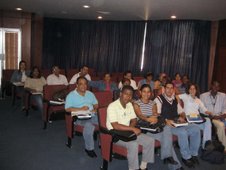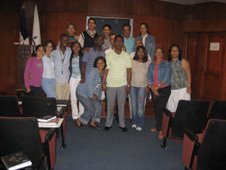Press Releases
New Bush-Clinton Katrina Fund Grants Highlight Ongoing Recovery Effort
City of New Orleans Joins President Clinton's Climate Initiative to Reduce Greenhouse Emissions
Published Friday, September 15, 2006 5:00 pm
NEW ORLEANS — Presidents George H. W. Bush and William J. Clinton today announced new Bush-Clinton Katrina Fund (BCKF) grants to assist victims of Hurricane Katrina in Louisiana, Mississippi and Alabama. The nation recently marked the one-year anniversary of Katrina’s landfall and the new grants reflect both presidents’ desire to maintain a consistent focus on the ongoing recovery effort. In announcing the new grants, the two presidents emphasized their desire to use the Fund to sustain the long-term recovery effort in the Gulf.
“Although much has been accomplished, rebuilding the Gulf Coast is really just beginning,” said President Bush. “As we continue to work with the affected communities and talk to the people on the ground, it’s clear that much work remains. These new grants reflect our interest in putting into place programs and people who will be here until the job is done.”
“We know that cities like New Orleans, Gulfport and Bayou La Batre are going to emerge stronger than ever, but only with a sustained and disciplined effort over the long-haul,” said President Clinton. “We can’t just remember the victims of Katrina on the anniversary of the storm. We have to work every day to help them rebuild. The National Housing Partnership and the National Council for Negro Women are rehabilitating damaged homes, because housing remains a critical need 12 months after the hurricane struck. Today, we’re also recognizing the long-term needs of the region by funding organizations like the Louisiana Human Resources Development Institute, which will offer worker training and job placement assistance.”
The new grants will help rebuild schools, rehabilitate and build new housing, help citizens get back to work, provide mental health services and ensure that the region’s rich culture and heritage remain distinguishing characteristics of Gulf region. Bush-Clinton Katrina Fund grants are already at work in the region and making an impact in the Gulf. As of August 31, 2006, the Bush-Clinton Katrina Fund has awarded $76 million or just over 60 percent of its available funds and the Fund is on track to disperse the remainder of its funds by the end of this year.
Of the total raised ($130 million), the allocation is as follows:
$30 million has been allocated to 33 institutions of higher education, including universities, colleges, community colleges and technical training institutions;
$40 million has been allocated for recovery funds set up by the governors of Louisiana, Mississippi and Alabama to fill unmet needs in their states;
$25 million has been allocated to religious organizations throughout the region; and
$35 million is allocated for projects focused on health, housing, education, community and infrastructure needs.
Joining President Clinton in New Orleans was Mayor Ray Nagin and Parish Presidents from the New Orleans area, who announced that the City and the greater New Orleans area would join the Clinton Climate Initiative (CCI) to address the crisis of global warming. The New Orleans metropolitan region is working to rebuild in an energy efficient and environmentally sound manner.
CCI was launched on August 1, 2006, in Los Angeles, with the announcement of a partnership with the Large Cities Climate Leadership Group. The partnership is currently coordinating the activities of 22 cities to reduce greenhouse gas emissions. Under the partnership, CCI is working to create a purchasing consortium to lower the prices of energy saving products, mobilize experts to provide technical assistance for cities and to create common measurement tools to allow cities to track their progress fighting the climate change crises.
In addition to opening the benefits of the Large Cities Climate Leadership Group to greater New Orleans, CCI will support the economic renewal of the city by helping small businesses compete in the field of energy efficient technology and will provide consultants to work with the city under the direction of city managers.
Summary of the BCKF grants:
Education
Global Green: Global Green will repair at least two schools in the New Orleans School District. These schools will be rehabilitated using the Leadership in Energy and Environmental design Green Building Rating system. In conjunction with building environmentally safe schools, Global Green will promote sustainable change in the region by providing technical expertise in green building design to the school system, key stakeholders and contracted construction workers.
Teach for America: Helping ensure that there are a sufficient number of teachers in the coming years, Teach for America will recruit, engage and retain approximately 40 corps members to teach in the Greater New Orleans area. These teachers will undergo teacher training and preparation, will have ongoing support and development and will participate in the training program that certifies teachers in the state of Louisiana.
United Negro College Fund (UNCF): The UNCF Wave of Hope campaign seeks to aid the rebuilding of the seven historically black colleges and universities (HBCUs) damaged by the storms along the Gulf Coast. HBCUs play an important role in their communities, providing opportunities for tens of thousands of students in the Gulf Regions. BCKF will assist UNCF’s effort to help rebuild these important institutions.
New Schools for New Orleans (NSNO): Using BCKF funding, NSNO will work primarily to ensure that charter schools are able to adequately serve the affected communities. NSNO will focus on personnel development and educational assessments of school performance and will develop a school investment fund. NSNO will also work as a resource for public schools in the area.
Health
Gulf Coast School Health Initiative – Children’s Health Fund: This initiative will link Mobile Medical Units with public school districts in hurricane-impacted communities in Mississippi and Louisiana. Hurricane Katrina left school districts struggling to provide the most basic services. The goal of the Mobile Medical Units is to improve health care at affected schools in New Orleans, Baton Rouge and Biloxi/Gulfport and provide primary care from the fully-equipped, self-contained units. BCKF funds will support the Initiative’s effort to ensure that more than 2,000 children a year receive primary care services and health education.
Housing
National Housing Partnership Foundation (NHP): NHP will build and rehabilitate approximately 3,000 homes in the Gulf Coast States of Mississippi, Alabama and Louisiana. NHP will rehabilitate and rebuild approximately 1,000 NHP owned homes and will acquire, rehabilitate and build an additional 2,000 affordable housing units. These developments will consist of multi-family, single family, elderly and mixed income projects.
Unified New Orleans Plan: In July of this year, the Mayor and City Council joined with the Greater New Orleans and Rockefeller Foundations to create the Unified New Orleans Plan (UNOP). The UNOP planning process is intended to create a single, citywide recovery and rebuilding plan as required by the Louisiana Recovery Authority to release certain federal funds. The UNOP plan will address the city’s infrastructure needs as well as neighborhood land-use and repopulation strategies.
The Rotary Club of Little Rock: BCKF funds will help renew the “Lacombe Village of Hope,” one of the oldest African-American communities in Louisiana. Working with community partners and volunteers, the Rotary has identified many homes to be renovated. Work on five houses has already begun and dozens of other homes have been assessed. BCKF funds will be used to restore as many homes as possible in this historic village, whose Catholic and Creole culture and heritage predates the Civil War.
National Council for Negro Women (NCNW): NCNW will work in Forest Heights, a neighborhood in Gulfport, MS, to rehabilitate and restore the homes that were damaged by the hurricane. NCNW will complete a survey and analysis of the damage, design a development plan and restore approximately 200 homes. Restoration will provide homeownership to low-income families in the hope of seeing residents return to the Forest Heights community.
The Fuller Center for Housing: Some 20,000 citizens, many of whom lost everything, fled to Shreveport, LA in the wake of Hurricane Katrina. BCKF funds will support the building of 10 houses during the week of September 18th. Approximately 300 volunteers from all over the U.S. and Canada plan to volunteer in this effort.
Workforce
Louisiana Human Resources Development Institute: Working with the local infrastructure that exists today, the Institute’s Centers for Employer and Worker Services (CEWS) will be centrally located in cities, provide worker training and work with employers to match those who are looking for work with new jobs. Where applicable, the Institute will provide wage subsidies to eligible employees.
Quality of Life
Music Rising: BCKF funds will be used to help bring music back to the Gulf Coast by replacing church choir instruments, musical equipment and sound systems that were lost during the hurricane. Founded in 2002 by U2’s The Edge, Gibson Guitar CEO Henry Jusziewicz and prominent music producer Bob Ezrin, Music Rising has raised funds through the exclusive sale of Gibson and Epiphone guitars and has already assisted nearly 2,000 musicians in the Gulf Coast.
The Bush-Clinton Katrina Fund seeks to make a distinctive impact on unmet needs in the Gulf region through grants helping to create financial self sufficiency for individuals and communities, foster economic opportunity for the people and organizations in the Gulf, and improve the quality of life for persons impacted by Hurricane Katrina.
For more information on the Bush-Clinton Katrina Fund visit: www.bushclintonkatrinafund.org. Inquiries can also be made directly to the Bush-Clinton Katrina Fund; 1301 K Street, NW, Suite 800 East; Washington, DC 20005; phone: 202-289-2732, fax: 202-289-1487.
###
Suscribirse a:
Enviar comentarios (Atom)












1 comentario:
The moment when the unusually powerful hurricane Katrina hit New Orleans in the summer of 2005, people insisted on being informed and on understanding the phenomenon. Let’s assume that winter temperatures turn suddenly to Ice Age conditions (not experienced for more than one hundred years), but no one talks about this because there is a war going on. That was the case during the winter of 1939/40, when, in several locations in Northern Europe, average temperatures were more degrees lower than during the previous century, and the WWII war machinery cooled down the earth for four decades.
You can found more on this theme on http://www.1ocean-1climate.com. There is a thesis about human action on the climate and the role that the naval war had in the climate change issue.
Publicar un comentario